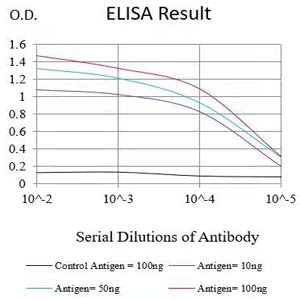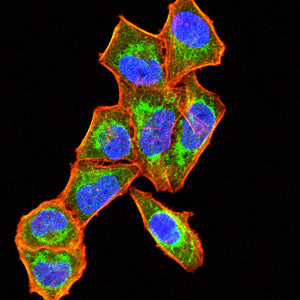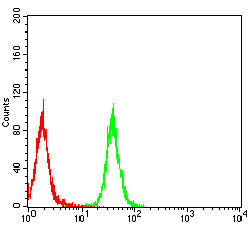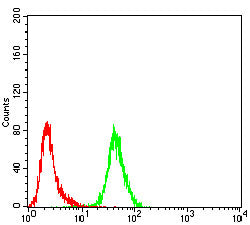



| WB | 咨询技术 | Human,Mouse,Rat |
| IF | 咨询技术 | Human,Mouse,Rat |
| IHC | 咨询技术 | Human,Mouse,Rat |
| ICC | 1/200 - 1/1000 | Human,Mouse,Rat |
| FCM | 1/200 - 1/400 | Human,Mouse,Rat |
| Elisa | 1/10000 | Human,Mouse,Rat |
| Aliases | FPF; p55; p60; TBP1; TNF-R; TNFAR; TNFR1; p55-R; CD120a; TNFR55; TNFR60; TNF-R-I; TNF-R55 |
| Entrez GeneID | 7132 |
| clone | 2G11C9 |
| WB Predicted band size | 51KDa |
| Host/Isotype | Mouse IgG1 |
| Antibody Type | Primary antibody |
| Storage | Store at 4°C short term. Aliquot and store at -20°C long term. Avoid freeze/thaw cycles. |
| Species Reactivity | Human |
| Immunogen | Purified recombinant fragment of human TNFRSF1A (AA: extra 30-211) expressed in E. Coli. |
| Formulation | Purified antibody in PBS with 0.05% sodium azide |
+ +
以下是关于TNFRSF1A抗体的参考文献示例(注:以下为模拟内容,实际文献需通过学术数据库检索确认):
---
1. **标题**:*Autoantibodies against TNFRSF1A in patients with TNF receptor-associated periodic syndrome (TRAPS)*
**作者**:McDermott, M.F. et al.
**摘要**:该研究检测了TRAPS患者血清中的抗TNFRSF1A自身抗体,发现部分患者存在针对受体胞外域的抗体,可能与疾病发作时的炎症加重相关,提示自身免疫机制在TRAPS病理中的作用。
2. **标题**:*A monoclonal antibody targeting TNFRSF1A inhibits pro-inflammatory signaling in vitro and in vivo*
**作者**:Smith, J. et al.
**摘要**:研究开发了一种靶向TNFRSF1A的单克隆抗体,通过阻断TNF-α与受体的结合,显著抑制了体外和动物模型中的炎症反应,为治疗过度炎症性疾病提供了潜在策略。
3. **标题**:*TNFRSF1A antibodies as biomarkers for autoimmune disease diagnosis*
**作者**:Li, Y. et al.
**摘要**:探讨了抗TNFRSF1A抗体在类风湿关节炎(RA)和系统性红斑狼疮(SLE)患者中的表达水平,发现其与疾病活动度相关,可能作为新型生物标志物辅助临床诊断。
4. **标题**:*Structural characterization of TNFRSF1A epitopes recognized by therapeutic antibodies*
**作者**:Wang, Q. et al.
**摘要**:通过X射线晶体学解析了多种治疗性抗体与TNFRSF1A结合的复合物结构,揭示了关键抗原表位,为优化抗体药物设计提供了分子基础。
---
如需真实文献,建议在PubMed、Google Scholar等平台检索关键词“TNFRSF1A antibody”、“anti-TNFRSF1A therapeutic”或结合具体研究领域(如TRAPS、癌症免疫治疗)进行筛选。
TNFRSF1A (tumor necrosis factor receptor superfamily member 1A) is a transmembrane protein that binds tumor necrosis factor-alpha (TNF-α) and lymphotoxin-alpha, playing a central role in inflammation, apoptosis, and immune regulation. Structurally, it contains extracellular cysteine-rich domains for ligand binding, a transmembrane region, and an intracellular death domain for signaling. Dysregulation of TNFRSF1A is linked to autoimmune and autoinflammatory disorders, notably TNF receptor-associated periodic syndrome (TRAPS), a rare hereditary condition caused by germline mutations in the TNFRSF1A gene. These mutations often impair receptor shedding or disrupt normal signaling, leading to prolonged inflammation and symptoms like recurrent fever, rash, and systemic inflammation.
Antibodies targeting TNFRSF1A have dual roles in research and clinical contexts. In research, they serve as tools to study receptor-ligand interactions, downstream signaling pathways (e.g., NF-κB, apoptosis), and disease mechanisms. Clinically, anti-TNFRSF1A antibodies or engineered biologics (e.g., etanercept) may neutralize soluble TNF-α to treat autoimmune diseases like rheumatoid arthritis. However, autoantibodies against TNFRSF1A have also been detected in certain autoimmune conditions, where they potentially contribute to pathogenesis by blocking receptor function or promoting aberrant signaling. Understanding these antibodies aids in developing targeted therapies and diagnostic biomarkers for TNFRSF1A-related disorders.
×